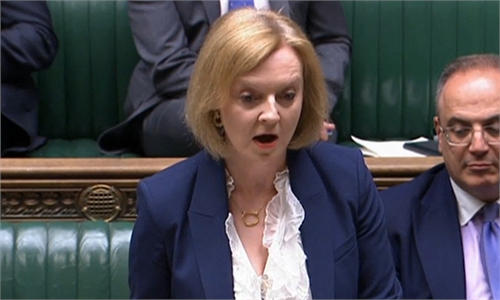UK PM candidate's reported 'China threat' label plan 'an irresponsible vote-puller', no good for solving its own problems: analysts

British Secretary for Foreign Affairs Liz Truss is pictured during a meeting with her Czech counterpart on May 27, 2022 in Prague. Photo: AFP
Chinese observers on Monday slammed the reported campaign pledge made by British prime ministerial candidate Liz Truss, saying the wording used in classifying China as a "threat" to national security was an irresponsible vote-puller, and warning that it would not help solve UK's own problems and would only damage the prospects for improving China-UK relations.
The reported labeling is both for canvassing for votes and also reflects the trend of UK authorities' increasingly hardened attitude toward China by riding on the US' anti-China chariot. But such an irresponsible move could affect economic and trade cooperation and even people-to-people exchanges between China and the UK, observers said.
China will be declared as a threat to UK's national security as part of UK Foreign Secretary and prime ministerial candidate Liz Truss' campaign pledge, UK media outlet The Times reported Monday, citing allies of Truss. If this classification is delivered, it will be a first for the British government.
In response to a question regarding the reported "China threat" labeling plan by Truss, Chinese Foreign Ministry spokesperson Zhao Lijian said at a routine news conference on Monday that "We do not comment on and have no interest in the UK's internal affairs, including the Conservative Party leadership election."
"Some UK politicians are finding fault with China or hyping the 'China threat', which is irresponsible and will not solve the UK's own problems," Zhao said.
Echoing the spokesperson's remarks, Liu Zuokui, a research fellow on European studies at the Chinese Academy of Social Sciences (CASS), told the Global Times that Truss, as a UK government official and a strong candidate to be the next prime minister, was irresponsible in making her strongly negative accusations against China, which will certainly damage the prospect of improving China-UK relations if she is elected.
However, experts also pointed out that the remarks are more likely to be solely for canvassing purposes because of Truss' status as a candidate. "The fact is, many candidates who are elected to key positions pursue policies that are completely different from what they advocated during the election," Liu said.
Cui Hongjian, another expert on China-EU relations, noted that Truss hopes to gain more votes during the election by appealing to populist sentiment within the UK as being tough on China is politically correct in the West.
The trend is evident in that the remaining two candidates for the leadership of the Conservative Party and the new prime minister of the UK have been competing with each other on who can play tougher against China during the election, even Rishi Sunak, the candidate who was perceived to support a balanced policy, is also making tough comments.
Experts believed that the toxic political atmosphere in the UK has poisoned China-UK relations, and even if some politicians clearly know that souring ties with China will eventually further dampen the UK economy, they tend to take the easy path of playing tough on China to cater to the anti-China sentiment.
Moreover, given its declining power and influence in recent years, the UK is now more interested in becoming the biggest US supporter in the Western world and has tied itself tightly to the chariot of the US, observers noted.
"The UK's anti-China strategy is the maximum level of support and cooperation shown after understanding the US' strategic intentions toward China," Cui said.
For example, due to the need of her campaign to become the next prime minister and also the UK's policy of clinging to the US' apron strings, Truss early this month summoned Chinese Ambassador to Britain Zheng Zeguang over the Taiwan question, criticizing China for its countermeasures over US House Speaker Nancy Pelosi's provocative visit to China's Taiwan region. UK's move was seen by Chinese analysts as Britain losing its credibility as an independent country.
Meanwhile, the recent disappointing solutions to domestic and livelihood issues by British politicians have led the prime ministerial candidates to turn to outside the country to find scapegoats in order to avoid internal divisions, Cui said.
China is the UK's third-biggest trading partner, and the UK Treasury and the Chinese Ministry of Finance have been optimistic over closer economic ties. However, if the UK insists on maintaining a negative attitude toward China, then the enthusiasm for this economic cooperation and even people-to-people exchanges will be dampened, experts said.
If major UK politicians continue to make irresponsible statements about China, China-UK relations will face great difficulties and challenges in the future, Feng Zhongping, director of the Institute of European Studies at the Chinese Academy of Social Sciences, told the Global Times.
"Before Brexit, UK's policy toward China was somewhat restricted, because EU countries had to coordinate with each other and many of them are more friendly to China," Feng said. "However, after Brexit, the UK has moved closer to the US and has come to see China more as a major competitor. If the UK continues to follow this path, then bilateral relations will face even greater difficulties."
Zhu Haoning also contributed to the story



